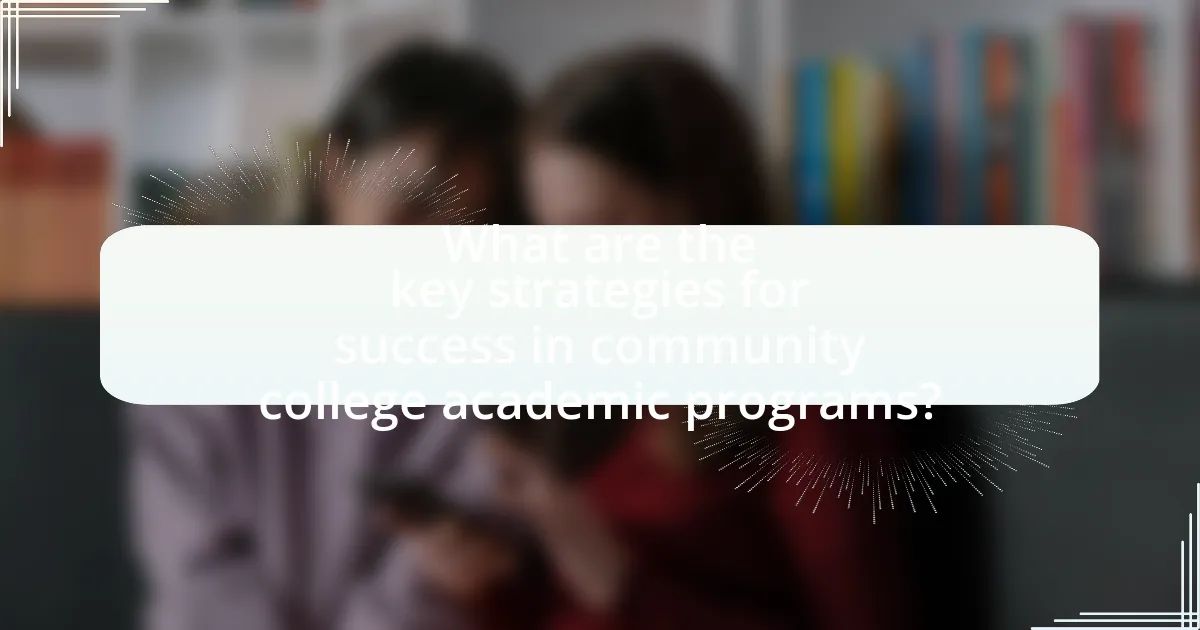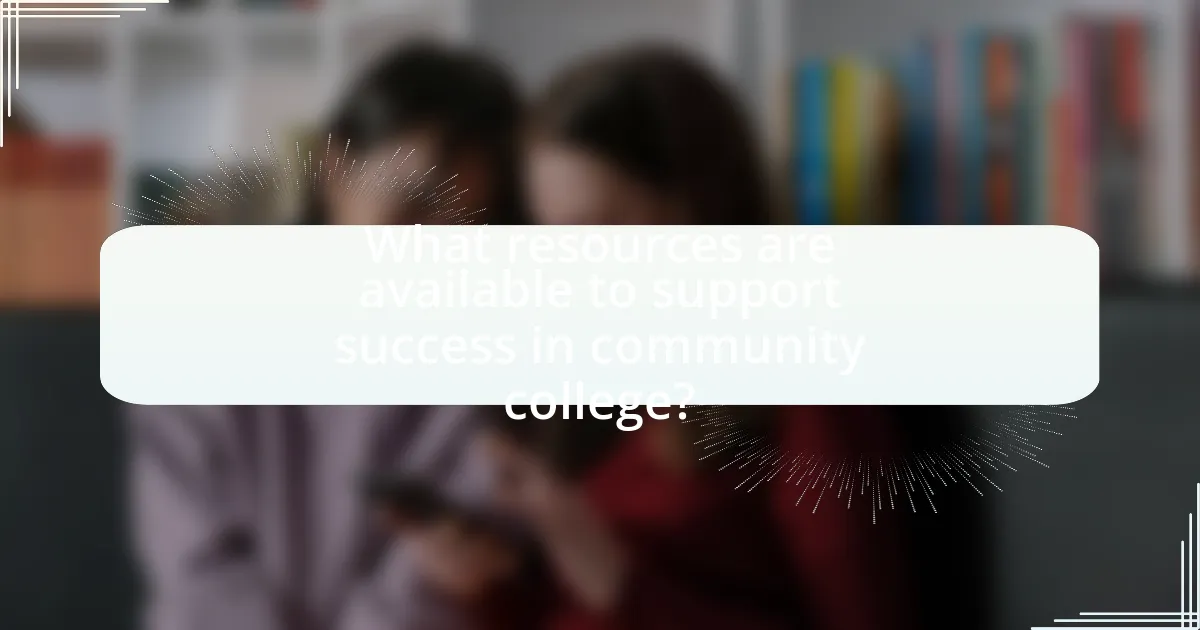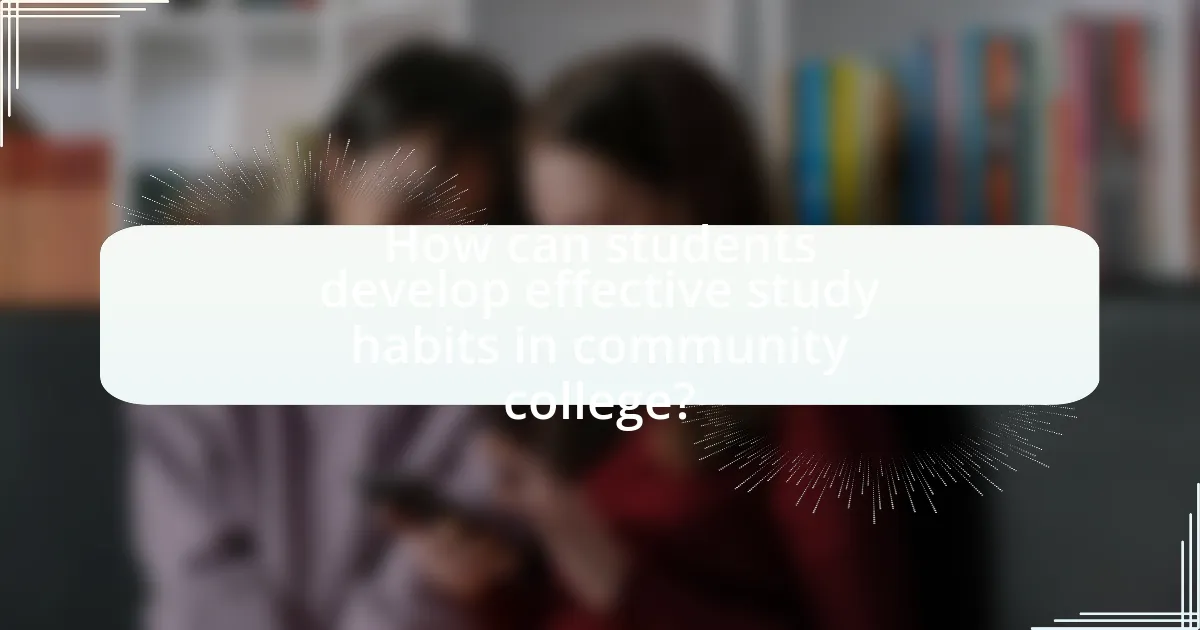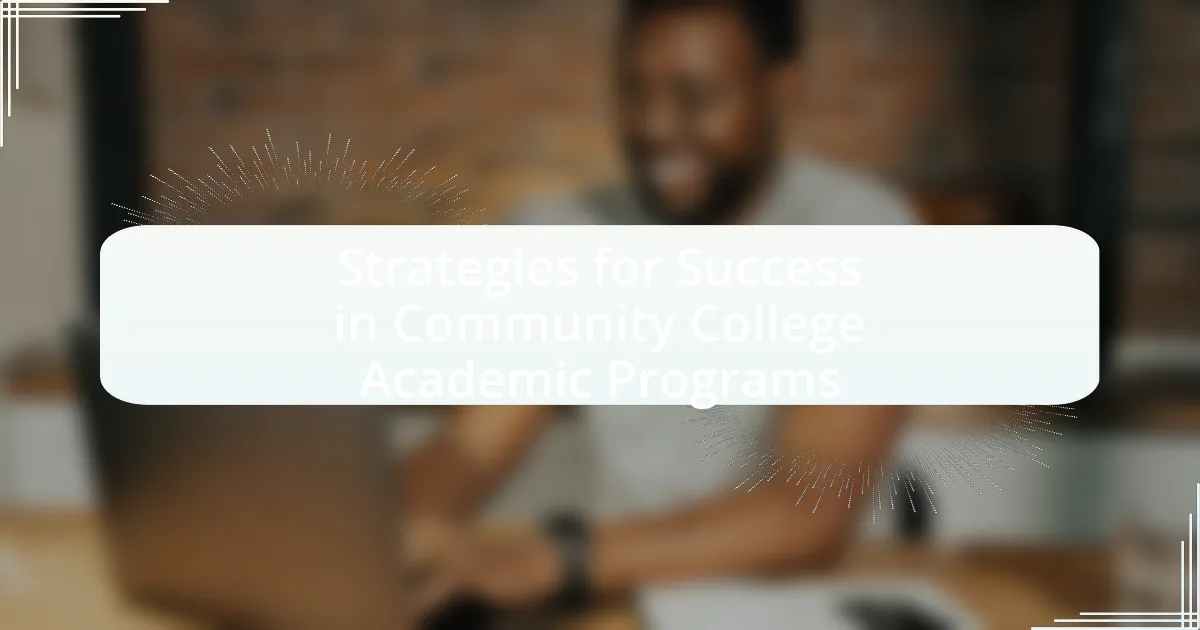The article focuses on key strategies for success in community college academic programs, emphasizing effective time management, active engagement in classes, and the utilization of available resources. It outlines techniques for managing time, such as prioritization and structured scheduling, and highlights the importance of academic advising and building a support network. Additionally, the article discusses the role of tutoring services, financial resources, and effective study habits in enhancing academic performance. By implementing these strategies, students can improve their retention rates and overall success in community college settings.

What are the key strategies for success in community college academic programs?
Key strategies for success in community college academic programs include effective time management, active engagement in classes, and utilizing available resources. Effective time management allows students to balance coursework, work, and personal commitments, which is crucial for maintaining academic performance. Active engagement, such as participating in discussions and seeking clarification from instructors, enhances understanding and retention of material. Utilizing resources like tutoring centers, academic advising, and study groups provides additional support, helping students navigate challenges and improve their academic skills. Research indicates that students who actively engage and utilize support services are more likely to complete their programs successfully.
How can students effectively manage their time in community college?
Students can effectively manage their time in community college by prioritizing tasks, creating a structured schedule, and utilizing time management tools. Prioritizing tasks involves identifying urgent and important assignments, which helps students focus on what needs immediate attention. Creating a structured schedule, such as a weekly planner, allows students to allocate specific time blocks for studying, attending classes, and completing assignments. Utilizing time management tools, like digital calendars or apps, can enhance organization and remind students of deadlines. Research indicates that students who implement structured time management strategies tend to achieve higher academic performance, as evidenced by a study published in the Journal of Educational Psychology, which found that effective time management correlates with improved grades and reduced stress levels.
What time management techniques are most effective for community college students?
Effective time management techniques for community college students include prioritization, the Pomodoro Technique, and the use of digital planners. Prioritization helps students focus on high-impact tasks, ensuring that essential assignments and deadlines are met first. The Pomodoro Technique, which involves working in focused intervals of 25 minutes followed by short breaks, enhances concentration and reduces burnout. Digital planners, such as Google Calendar or Trello, allow students to organize their schedules visually, set reminders, and track progress, which has been shown to improve academic performance and reduce stress levels. Studies indicate that students who implement these techniques experience better time management and academic success.
How can prioritizing tasks improve academic performance?
Prioritizing tasks can significantly improve academic performance by enhancing focus and time management. When students identify and tackle high-priority assignments first, they allocate their cognitive resources more effectively, leading to better understanding and retention of material. Research indicates that students who prioritize their tasks report higher grades and lower stress levels, as they can manage their workload more efficiently. For instance, a study published in the Journal of Educational Psychology found that students who utilized prioritization strategies achieved an average of 15% higher in their overall GPA compared to those who did not. This demonstrates that effective task prioritization directly correlates with improved academic outcomes.
What role does academic advising play in student success?
Academic advising plays a crucial role in student success by providing personalized guidance that helps students navigate their academic journey effectively. This support includes assistance with course selection, understanding degree requirements, and developing academic plans tailored to individual goals. Research indicates that students who engage in regular academic advising are more likely to persist in their studies and achieve higher GPAs. For instance, a study published in the Journal of College Student Development found that students who utilized academic advising services had a 10% higher retention rate compared to those who did not. This demonstrates that effective academic advising is integral to fostering student engagement and success in community college programs.
How can students benefit from regular meetings with academic advisors?
Students benefit from regular meetings with academic advisors by receiving personalized guidance that enhances their academic success. These meetings allow students to discuss their academic goals, course selections, and any challenges they face, leading to tailored advice that aligns with their individual needs. Research indicates that students who engage regularly with academic advisors are more likely to persist in their studies and achieve higher GPAs, as they receive support in navigating academic policies and resources. For instance, a study published in the Journal of College Student Development found that proactive advising significantly improves student retention rates, demonstrating the critical role advisors play in fostering student success in community college programs.
What questions should students ask their academic advisors?
Students should ask their academic advisors questions about course selection, degree requirements, transfer options, and available resources. Specifically, they can inquire about which courses align with their career goals, the prerequisites for their intended major, and the timeline for completing their degree. Additionally, students should ask about opportunities for internships, tutoring services, and academic support programs. These questions help ensure that students make informed decisions that align with their academic and career aspirations, ultimately enhancing their success in community college programs.
Why is building a support network important for community college students?
Building a support network is crucial for community college students because it enhances their academic success and personal well-being. A strong support network provides access to resources, mentorship, and emotional support, which are essential for navigating the challenges of college life. Research indicates that students with supportive relationships are more likely to persist in their studies and achieve higher grades. For instance, a study published in the Journal of College Student Development found that social support significantly correlates with academic performance and retention rates among community college students. This evidence underscores the importance of fostering connections with peers, faculty, and community resources to create a conducive learning environment.
What types of support networks can students create?
Students can create various types of support networks, including study groups, mentorship programs, peer tutoring, and online forums. Study groups allow students to collaborate on coursework and share resources, enhancing understanding and retention of material. Mentorship programs connect students with experienced individuals who provide guidance and support, fostering personal and academic growth. Peer tutoring enables students to assist each other in specific subjects, promoting a collaborative learning environment. Online forums facilitate communication and resource sharing among students, especially for those who may not be able to meet in person. These networks are essential for academic success, as they provide emotional support, enhance learning, and build a sense of community among students.
How can peer study groups enhance learning outcomes?
Peer study groups enhance learning outcomes by promoting collaborative learning and increasing engagement among students. Research indicates that students who participate in peer study groups demonstrate improved retention of information and higher academic performance. A study published in the Journal of Educational Psychology found that collaborative learning environments lead to deeper understanding and mastery of subjects, as students explain concepts to one another and fill in knowledge gaps. Additionally, peer study groups foster a sense of community, which can reduce feelings of isolation and increase motivation, further contributing to better academic results.

What resources are available to support success in community college?
Community colleges offer various resources to support student success, including academic advising, tutoring services, financial aid, and counseling. Academic advising helps students create educational plans and navigate course selections, ensuring they meet degree requirements. Tutoring services provide personalized assistance in subjects like math, writing, and science, enhancing understanding and performance. Financial aid resources, such as grants, scholarships, and work-study programs, alleviate financial burdens, making education more accessible. Counseling services address personal, academic, and career-related challenges, promoting overall well-being and success. These resources collectively contribute to improved retention and graduation rates among community college students.
How can tutoring services aid in academic achievement?
Tutoring services can significantly aid in academic achievement by providing personalized instruction tailored to individual learning needs. This personalized approach allows students to grasp complex concepts more effectively, leading to improved understanding and retention of material. Research indicates that students who engage in tutoring often experience higher grades and increased confidence in their academic abilities. For instance, a study published in the Journal of Educational Psychology found that students receiving tutoring scored, on average, 12% higher on assessments compared to their peers who did not utilize such services. This evidence underscores the positive impact of tutoring on academic performance, particularly in community college settings where students may face unique challenges.
What subjects typically offer tutoring services in community colleges?
Community colleges typically offer tutoring services in subjects such as mathematics, English, science, and foreign languages. These subjects are commonly supported due to their foundational importance in academic programs and the high demand for assistance among students. For instance, mathematics tutoring often includes topics ranging from basic arithmetic to calculus, while English tutoring may focus on writing skills and literature analysis. Science tutoring frequently covers disciplines like biology, chemistry, and physics, and foreign language tutoring can include languages such as Spanish, French, and Mandarin. The availability of these tutoring services is designed to enhance student success and retention rates in community college academic programs.
How can students find and utilize tutoring resources effectively?
Students can find and utilize tutoring resources effectively by actively seeking out available services through their community college’s academic support center and utilizing online platforms. Community colleges often provide dedicated tutoring services, which can be accessed through their websites or by visiting the academic support center in person. Additionally, students can leverage online tutoring platforms such as Khan Academy or Tutor.com, which offer a wide range of subjects and flexible scheduling. Research indicates that students who engage with tutoring services tend to achieve higher academic performance, as evidenced by a study published in the Journal of Educational Psychology, which found that students who utilized tutoring resources improved their grades by an average of 1.5 letter grades.
What online resources can enhance learning in community college?
Online resources that can enhance learning in community college include platforms like Coursera, Khan Academy, and edX, which offer a wide range of courses and materials. These platforms provide access to high-quality educational content from reputable institutions, allowing students to supplement their coursework and gain additional skills. For instance, Coursera partners with universities to offer courses that can help students understand complex subjects, while Khan Academy provides free resources for subjects like math and science, which are crucial for many community college programs. Additionally, online libraries such as JSTOR and Google Scholar give students access to academic papers and research articles, supporting their studies with credible sources.
Which online platforms provide valuable academic materials?
Online platforms that provide valuable academic materials include Coursera, Khan Academy, and JSTOR. Coursera offers a wide range of courses from universities and institutions, allowing students to access lectures and materials on various subjects. Khan Academy provides free educational resources, including instructional videos and practice exercises, covering topics from math to science. JSTOR is a digital library that offers access to thousands of academic journals, books, and primary sources, making it a crucial resource for research and scholarly work. These platforms are widely recognized for their contributions to academic learning and research support.
How can students leverage online forums for academic support?
Students can leverage online forums for academic support by actively participating in discussions, asking questions, and sharing resources. Engaging in these platforms allows students to connect with peers and educators, facilitating the exchange of knowledge and clarification of complex topics. Research indicates that collaborative learning environments, such as online forums, enhance understanding and retention of information, as students benefit from diverse perspectives and collective problem-solving. For instance, a study published in the Journal of Educational Psychology found that students who engaged in online discussions performed better academically compared to those who did not participate. This demonstrates the effectiveness of online forums as a valuable resource for academic support.
What financial resources are available to community college students?
Community college students have access to various financial resources, including federal and state grants, scholarships, work-study programs, and student loans. Federal Pell Grants, for instance, provide need-based financial aid to low-income students, with the maximum award for the 2023-2024 academic year being $7,395. Additionally, many states offer their own grant programs, such as the California College Promise Grant, which waives tuition for eligible students. Scholarships from private organizations and community foundations also support students financially, often based on merit or specific criteria. Furthermore, work-study programs allow students to earn money while attending school, helping to cover living expenses. These resources collectively aim to reduce the financial burden on community college students and facilitate their academic success.
How can scholarships and grants alleviate financial burdens?
Scholarships and grants alleviate financial burdens by providing students with funds that do not require repayment, thereby reducing the overall cost of education. These financial aids enable students to cover tuition fees, textbooks, and other educational expenses, which can significantly lessen the reliance on student loans. According to the National Center for Education Statistics, in the 2019-2020 academic year, approximately 70% of full-time undergraduate students received some form of financial aid, including scholarships and grants, which helped to lower their average debt upon graduation. This financial support allows students to focus more on their studies and less on financial stress, ultimately contributing to higher retention and graduation rates in community college programs.
What are the steps to apply for financial aid?
To apply for financial aid, follow these steps: First, complete the Free Application for Federal Student Aid (FAFSA) form, which is essential for determining eligibility for federal, state, and institutional financial aid. Next, gather necessary documents such as tax returns, W-2 forms, and Social Security numbers to provide accurate information on the FAFSA. After submitting the FAFSA, review the Student Aid Report (SAR) you receive, which summarizes your financial information and indicates your Expected Family Contribution (EFC). Finally, contact your college’s financial aid office to discuss your aid options, including grants, scholarships, and loans, based on the information provided in your FAFSA and SAR. These steps are crucial as they ensure you access the financial resources needed to support your education in community college programs.

How can students develop effective study habits in community college?
Students can develop effective study habits in community college by establishing a structured study schedule, utilizing active learning techniques, and seeking academic support when needed. A structured study schedule helps students allocate specific times for studying, which can enhance focus and retention of material. Active learning techniques, such as summarizing information, teaching concepts to peers, and engaging in discussions, have been shown to improve understanding and memory retention. Additionally, utilizing resources like tutoring centers and study groups can provide essential support and motivation, as studies indicate that collaborative learning can lead to higher academic performance.
What study techniques are most effective for community college courses?
Active learning techniques, such as summarization, self-explanation, and practice testing, are the most effective study methods for community college courses. Research indicates that these techniques enhance retention and understanding of material. For instance, a study by Dunlosky et al. (2013) published in “Psychological Science in the Public Interest” found that practice testing significantly improves long-term retention compared to other methods. Additionally, self-explanation encourages deeper processing of information, leading to better comprehension. Implementing these techniques can lead to improved academic performance in community college settings.
How can active learning strategies improve retention of information?
Active learning strategies improve retention of information by engaging students in the learning process through activities that promote critical thinking and application of knowledge. Research indicates that when students participate in discussions, problem-solving, and collaborative projects, they are more likely to retain information compared to traditional lecture-based learning. For instance, a study by Freeman et al. (2014) published in the Proceedings of the National Academy of Sciences found that active learning increased exam scores by an average of 6% in STEM courses, demonstrating a clear link between engagement and retention. This active involvement helps to reinforce concepts and create meaningful connections, leading to better long-term memory retention.
What role does note-taking play in effective studying?
Note-taking plays a crucial role in effective studying by enhancing comprehension and retention of information. When students actively engage in note-taking, they process and organize material, which leads to better understanding and memory recall. Research indicates that students who take notes during lectures perform better on exams compared to those who do not, as noted in a study published in the journal “Psychological Science” by Mueller and Oppenheimer in 2014. This study found that handwritten notes promote deeper cognitive processing, which is essential for learning. Therefore, effective note-taking strategies are vital for academic success in community college programs.
How can students prepare for exams in community college?
Students can prepare for exams in community college by creating a structured study plan that includes regular review sessions, practice exams, and active engagement with course materials. A structured study plan helps students allocate sufficient time for each subject, ensuring comprehensive coverage of the material. Regular review sessions reinforce learning and improve retention, while practice exams familiarize students with the exam format and types of questions they may encounter. Active engagement, such as participating in study groups or seeking help from instructors, enhances understanding and clarifies difficult concepts. Research indicates that students who employ these strategies tend to achieve higher academic performance, as evidenced by studies showing that structured study habits correlate with improved grades in community college settings.
What are the best practices for exam preparation?
The best practices for exam preparation include creating a study schedule, utilizing active learning techniques, and practicing with past exams. A study schedule helps allocate specific times for each subject, ensuring comprehensive coverage of material. Active learning techniques, such as summarizing information, teaching concepts to others, and engaging in group discussions, enhance retention and understanding. Practicing with past exams familiarizes students with the exam format and types of questions, improving confidence and performance. Research indicates that students who employ these strategies tend to achieve higher grades, as evidenced by a study published in the Journal of Educational Psychology, which found that structured study habits significantly correlate with academic success.
How can practice tests enhance exam readiness?
Practice tests enhance exam readiness by allowing students to assess their knowledge and identify areas needing improvement. Engaging in practice tests simulates the exam environment, which helps reduce anxiety and improve time management skills. Research indicates that students who take practice tests perform better on actual exams; for instance, a study published in the journal “Psychological Science” found that retrieval practice, such as taking practice tests, significantly boosts long-term retention of information. This method not only reinforces learning but also builds confidence, making students more prepared for their assessments.
What tips can help students maintain motivation throughout their studies?
To maintain motivation throughout their studies, students should set clear, achievable goals. Establishing specific objectives helps students focus their efforts and provides a sense of direction. Research indicates that goal-setting can enhance motivation by creating a roadmap for success, as outlined in the study “The Effects of Goal Setting on Academic Performance” by Locke and Latham, which demonstrates that individuals who set specific goals perform better than those who do not. Additionally, students should develop a consistent study routine, as regular habits can reinforce discipline and commitment. Engaging with peers for support and accountability also fosters motivation, as social interactions can enhance the learning experience and provide encouragement.
How can setting goals improve student motivation?
Setting goals can significantly improve student motivation by providing clear direction and measurable benchmarks for success. When students establish specific, achievable goals, they create a roadmap that helps them focus their efforts and track their progress. Research indicates that goal-setting enhances motivation by increasing self-efficacy, as students feel a sense of accomplishment when they meet their targets. For instance, a study published in the Journal of Educational Psychology found that students who set specific academic goals were more likely to engage in behaviors that led to higher academic performance, demonstrating the direct correlation between goal-setting and motivation.
What strategies can help students overcome academic challenges?
Students can overcome academic challenges by implementing effective time management, seeking academic support, and developing strong study habits. Time management allows students to prioritize tasks and allocate sufficient time for studying, which is crucial for mastering complex subjects. Research indicates that students who use planners or digital tools to organize their schedules tend to perform better academically. Seeking academic support, such as tutoring or mentoring, provides students with additional resources and guidance, enhancing their understanding of course material. A study by the National Center for Education Statistics found that students who utilize tutoring services have higher retention rates. Lastly, developing strong study habits, including active learning techniques like summarization and self-testing, has been shown to improve information retention and comprehension, as evidenced by research published in the Journal of Educational Psychology.

Leave a Reply